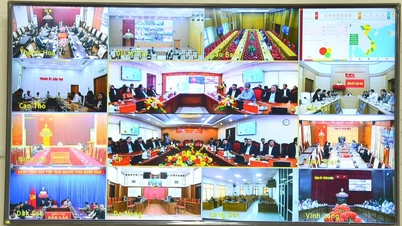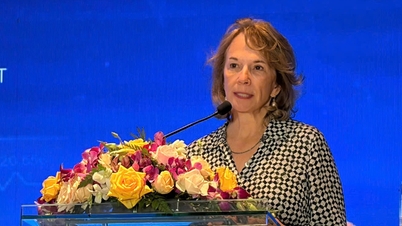 |
Social networks play an increasingly important role in the daily lives of young people. Photo: Ypulse . |
A Pew Research Center survey of nearly 1,400 parents and students found that 44% of parents and 22% of children said social media had a negative impact on young people’s mental health. However, the problem lies in how they communicate and handle conflicts.
The next generation, especially Gen Z, has a reserved but vulnerable way of communicating online. Some habits such as reading messages but not responding, using teasing jokes, and humorous puns are becoming more common.
An emoji or punctuation mark can also change the tone of a sentence. They may be harmless, but sometimes they have a deeper meaning, making young people worry and wonder about the speaker's intentions.
Tendency to avoid conflict
“Phones definitely make it easier to ignore someone you don’t want to talk to,” said Scholastic’s Kids Reporters, a group of 10-14 year olds who are participating in a journalism training program for children around the world . They came to this conclusion through observations at the school where they work.
Texting makes it easier to leave a conversation by saying “wait a minute,” or not at all. These are called silent signals. In real life, it is difficult to “see no reply” to someone.
These signals also serve to express the sender’s feelings. “To let someone know I’m mad at them, I’ll stop seeing them in person and mute their chat notifications for a while. It sounds childish, but a lot of people do it that way,” said a 13-year-old.
 |
Silent chat signals on social networks. Photo: TikTok. |
The same goes for removing someone from your Instagram friends list, texting “ok,” or using the traditional smiley face emoji at the end of a sentence. Akshaya, another group member, says something more serious is unfollowing someone entirely. “Online communication makes it so much easier to be passive aggressive,” she says.
Emily Weinstein, director of the Center for Digital Studies at Harvard University, says this can cause a spiral of anxiety. It’s easy for the other person to wonder if the other person is angry with them, or if they’ve done something wrong, leading to anxiety and self-blame.
"The flag" or the fear of not fitting in?
A big fear of young people is to behave properly, not to be seen as showing off. Failure to do so will result in being called a "bicycle bell".
The bicycle bell makes a “cringe” sound, originally from cringe, an English word meaning to shrink, or cower in shame, or find it strange. On social media, this word often has a negative connotation, describing a situation, a saying, or an action of someone that makes others feel ashamed for them.
On social platforms, especially Threads, users freely share what they consider to be overly awkward situations. Most of them are screenshots of messages on dating apps, including conversations, accounts that are considered stiff, or too ridiculous.
 |
Users share about things that make them feel "caught." Photo: Threads. |
In this case, cringe becomes a red flag in a potential date. According to young people interviewed by Wired , when it comes to online dating, sincerity and seriousness can sometimes be seen as something Gen Z finds embarrassing.
Wolfram, one of the young men, thought that a potential partner had to be funny. Trying to find something funny to say in return was a must. Sometimes it became so difficult that he never responded to the other person again.
For Hoang Mai (25 years old, Ho Chi Minh City), “flagging” is the most obvious sign to avoid someone, especially on social networks. “I think people are trying to be funny, forcing themselves to use trendy words, updating trends to fit in,” she said.
The invisible "mask" layer
It can be less painful to be upfront about a problem than to leave confusing signals. One child told Scholastic’s Kids Reporters that he learned his friends had secretly created their own group chat when the messages in the old group started to dry up. “It was so sad, I didn’t even get an explanation,” he said.
Meanwhile, Jordan Meisel, a New York-based psychologist who works with students and young adults, has found that this group is increasingly wary of honesty. They tend to project an image of who they want to be, because “the image that reflects who you really are makes you much more vulnerable,” she says.
Many of Meisel’s young patients are lonely, isolated, and socially anxious, but don’t understand why. For them, too many terms like cringe are used to attack them and control how they interact with society.
For example, when they first enter college, or go on their first date, or meet new people, they always have the fear of being seen as trying too hard or being different. Through conversations, Meisel realizes that it is the fear of being judged and hurt that is causing them to keep their distance from others.
In another development, Gen Z being reserved with emotions does not mean they do not have emotions. Thao Vy (22 years old, Ho Chi Minh City) said that she chooses to express herself in more intimate groups, such as friends and family to avoid being hurt. The action of “seeing but not replying” sometimes also means that the person needs time to think to make an important decision.
Darja Djordjevic, a psychiatrist who works at Stanford Brainstorm, believes that life is full of conflict and that everyone should be equipped with conflict management skills. “We learn how to argue and fight in a healthy way through face-to-face interactions,” she says. Being open about it is a good way to practice it.
Source: https://znews.vn/co-rinh-seen-khong-rep-va-mat-trai-giao-tiep-so-cua-gen-z-post1554257.html































![[Video] The craft of making Dong Ho folk paintings has been inscribed by UNESCO on the List of Crafts in Need of Urgent Safeguarding.](https://vphoto.vietnam.vn/thumb/402x226/vietnam/resource/IMAGE/2025/12/10/1765350246533_tranh-dong-ho-734-jpg.webp)







































































Comment (0)